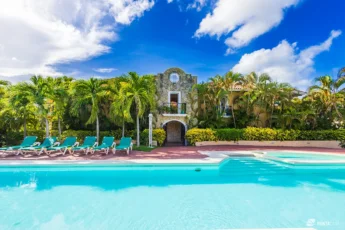Navigating Misleading Photos and Descriptions in Punta Cana Vacation Listings
Understanding the Challenge of Misleading Vacation Listings

Navigating Misleading Photos and Descriptions in Punta Cana Vacation Listings
In the vibrant and highly sought-after destination of Punta Cana, vacation rentals are in high demand. However, the allure of this tropical paradise is sometimes overshadowed by the prevalence of misleading vacation listings. Understanding the dynamics behind these deceptive practices is crucial for travelers seeking an authentic and joyful experience.
1. The Prevalence of Misleading Listings
Punta Cana, with its stunning beaches and luxurious resorts, is a magnet for tourists. Unfortunately, the popularity of this destination also attracts unscrupulous advertisers who seek to capitalize on the influx of travelers. Misleading listings are surprisingly common in such tourist hotspots, often due to the intense competition among property owners and managers.
Several factors contribute to the prevalence of misleading listings. First, the sheer volume of vacation properties available in Punta Cana makes it difficult for potential renters to scrutinize each listing thoroughly. Additionally, the anonymity afforded by online platforms can embolden some advertisers to exaggerate or fabricate details to stand out from the competition.
2. Common Tactics Used in Misleading Listings
Understanding the tactics used by advertisers can help travelers identify and avoid misleading listings. One common trick is the use of strategically cropped photos that omit less favorable aspects of a property. For example, a listing might showcase a pristine pool without revealing the cluttered surroundings or the proximity to a noisy roadway.
Another tactic involves using deceptive language. Descriptors like “cozy” may imply cramped spaces, while “rustic charm” might be a euphemism for outdated facilities. Advertisers often highlight amenities or views that are not actually part of the property, creating unrealistic expectations.
3. The Impact of Misleading Listings on Travelers
The fallout from misleading listings can be significant, affecting both the emotional and financial aspects of a traveler’s experience. Travelers arrive with high expectations, only to be met with disappointment upon discovering that their accommodations do not match the advertised descriptions or photos. This can lead to stress, additional expenses, and a diminished vacation experience.
Moreover, the financial implications of misleading listings can be substantial. Travelers may face unexpected costs to find alternative accommodations or amenities that were falsely advertised. The lack of trust in future bookings can also make travelers wary, impacting their willingness to explore new destinations.
Navigating the world of vacation rentals in Punta Cana requires vigilance and a keen eye for detail. By understanding the challenges presented by misleading listings, travelers can better equip themselves to make informed decisions and ensure a more enjoyable stay in this beautiful destination.
Recognizing Red Flags in Photos and Descriptions

Punta Cana
Identifying misleading elements in vacation listings requires a keen eye and a bit of detective work. By learning to recognize certain red flags, travelers can protect themselves from disappointment and ensure a more enjoyable vacation in Punta Cana.
1. Spotting Photo Manipulation
One of the most common tactics used in misleading vacation listings is photo manipulation. This can range from subtle enhancements to outright deception. Here are some tips to help you spot these tricks:
- Inconsistent Lighting and Shadows: Look for discrepancies in lighting and shadows within the same photo. If the lighting seems unnatural or too perfect, it might be digitally altered.
- Fish-Eye Lens Effects: Properties may appear larger and more spacious due to the use of wide-angle or fish-eye lenses. Check for distorted objects near the edges of the photo, which could indicate such lens usage.
- Mismatched Colors: Be wary of colors that seem overly vibrant or unnatural. Enhanced saturation can make rooms appear more appealing than they actually are.
- Hidden Imperfections: Note any strategic angles that might hide less appealing aspects of the property, such as chipped paint or outdated fixtures.
2. Analyzing Descriptive Language
The language used in a listing can often be as telling as the photos. Here’s how to decode the descriptions:
- Buzzword Overload: Phrases like “luxurious,” “spacious,” or “breathtaking” are subjective. Cross-check these claims with photos and reviews.
- Vague Descriptions: Listings that describe features in broad terms without specifics may be hiding something. For example, “close to the beach” could mean anything from a short walk to a long drive.
- Avoidance of Details: A lack of detailed information about the property’s amenities or specific features might indicate an attempt to gloss over deficiencies.
3. Cross-Referencing with Reviews and Maps
To further ensure the accuracy of a listing, take the following steps:
- Read Guest Reviews: Reviews often reveal truths about a property that the listing might not disclose. Look for patterns in guest feedback, especially regarding cleanliness, location, and amenities.
- Use Map Tools: Verify the property’s location using online maps. Check the proximity to attractions, beaches, and amenities to confirm the listing’s claims.
- Look for Recent Photos: If possible, find traveler-uploaded images on social media platforms. These can provide a more current and honest view of the property.
Our Apartments for Rent in Punta Cana
If you’re planning to visit Punta Cana, consider exploring our collection of apartments available for rent. Each listing is verified to ensure authenticity and quality, offering you peace of mind for your vacation stay.

Event Venue for Rent in Bavaro Beach, Punta Cana
from $2000 night Read more
Quiet and Cozy Family Apartments for Rent - Directly on the Bavaro Beach, Punta Cana
from $199 night Read more
Amazing Lakeview 4BR Apartment in Secure Cocotal Community, Punta Cana
from $119 night Read more
Secure & Private 2 BR Apartment for Rent in Cocotal, Punta Cana
from $99 night Read moreStrategies for Verifying Listing Authenticity
When planning a vacation, ensuring the authenticity of your accommodation can mean the difference between a dream getaway and a disappointing experience. With the prevalence of misleading listings, especially in tourist hotspots like Punta Cana, travelers must adopt effective strategies to verify the accuracy of what they see online.
1. Contacting the Host Directly
Reaching out directly to the property owner or manager is a proactive step in verifying the authenticity of a vacation listing. This direct communication avenue allows potential guests to ask specific questions that might not be addressed in the listing. Consider these tips when contacting hosts:
- Request Additional Photos: Ask for recent photos of the property that may not be included in the listing. This can provide a more comprehensive view of the space and its current condition.
- Clarify Details: Inquire about specific amenities or features that are important to your stay, such as Wi-Fi quality, proximity to attractions, or kitchen facilities.
- Gauge Responsiveness: The speed and clarity of the host’s responses can be a good indicator of their reliability and willingness to accommodate guests’ needs.
Such direct engagement not only aids in gathering accurate information but also helps in establishing a rapport with the host, which can enhance your overall experience.
2. Utilizing Online Resources and Forums
The digital world offers a wealth of information that can be leveraged to verify vacation listings. Various online resources and forums provide platforms for travelers to share their experiences and insights. Here’s how you can use them:
- Travel Forums: Websites like TripAdvisor or Lonely Planet’s Thorn Tree are excellent sources for real traveler reviews and discussions about specific properties or areas.
- Social Media Groups: Platforms such as Facebook host groups dedicated to travel in specific regions, including Punta Cana. These groups can be a treasure trove of firsthand accounts and photos from fellow travelers.
- Check Reputable Review Sites: Look for patterns in reviews on sites like Google or Yelp, paying attention to recurring positive or negative comments related to your potential booking.
Comparison of Online Resources for Verifying Listings
| Resource | Type of Information | Reliability | Ease of Access |
|---|---|---|---|
| Travel Forums | Discussions and detailed reviews | High | Moderate |
| Social Media Groups | Photos and personal experiences | Varies | High |
| Review Sites | Ratings and aggregated reviews | High | Easy |
Leveraging these resources empowers you to make informed decisions based on a diverse range of perspectives and experiences.
3. Engaging a Travel Agent or Local Expert
For those who prefer a more hands-off approach, engaging a travel agent or local expert can be a valuable strategy. These professionals often have direct connections with property owners and firsthand knowledge of the area. Here’s why they can be beneficial:
- Expert Insight: Travel agents and local experts can provide recommendations based on your preferences and past client feedback.
- Verification: They have the resources to verify the legitimacy of listings and can often secure better rates or added perks.
- Peace of Mind: Knowing that a professional has vetted your accommodation can alleviate the stress of potential misrepresentation.
Incorporating these strategies into your booking process can significantly reduce the risk of encountering misleading vacation listings and ensure that your stay in Punta Cana is as enjoyable and relaxing as you envisioned.
Section 4: Protecting Yourself from Deceptive Listings
Navigating the world of vacation rentals can be challenging, especially when faced with the risk of deceptive listings. However, by taking proactive steps, travelers can guard themselves against potential pitfalls and enjoy a stress-free vacation experience.
1. Booking Through Reputable Platforms
Choosing the right booking platform is a crucial first step in safeguarding your vacation experience. Reputable platforms like Airbnb, Vrbo, and Booking.com have established strong consumer protection policies that help mitigate the risks of encountering misleading listings. These platforms often have mechanisms in place for verifying property details and ensuring that hosts adhere to certain standards.
When selecting a platform, consider the following:
- Verified Reviews: Look for platforms that feature reviews from verified guests. This ensures that the feedback comes from individuals who have actually stayed at the property, providing a more accurate reflection of the experience.
- Host Verification: Some platforms offer additional verification for hosts, such as identity checks or property inspections. Opting for listings with verified hosts can add an extra layer of security.
- Resolution Centers: Platforms with dedicated resolution centers can mediate conflicts between guests and hosts, offering a safety net in case of disputes.
2. Understanding Cancellation and Refund Policies
Cancellation and refund policies are often overlooked aspects of booking vacation rentals, yet they play a critical role in protecting travelers from unexpected changes or deceptive practices. Thoroughly understanding these policies can save you from potential financial losses.
Key points to examine include:
- Flexible Policies: Opt for properties with flexible or moderate cancellation policies, which allow for adjustments or cancellations without hefty penalties.
- Refund Procedures: Ensure you understand the refund process, including the timeline for receiving refunds and any associated fees.
- Policy Clarity: Avoid listings with vague or overly complex cancellation terms. Clear and straightforward policies are easier to navigate and offer better protection.
3. Documenting Communication and Agreements
Maintaining a comprehensive record of all interactions with property owners or agents is a critical measure in protecting yourself from deceptive listings. This documentation can serve as evidence in case of disputes and ensure that all parties are on the same page.
Steps to effectively document communications include:
- Save All Correspondence: Keep copies of all emails, messages, and communications with the host. Ensure that any agreements or promises made are recorded in writing.
- Request Written Confirmations: If any verbal agreements are made, request written confirmation via email or through the platform’s messaging system.
- Take Screenshots: Capture screenshots of the listing details, including photos and descriptions, at the time of booking. This can be useful if discrepancies arise later.
By implementing these measures, travelers can significantly reduce the risk of falling victim to misleading vacation rental listings. The peace of mind gained from knowing you’re protected allows you to focus on creating unforgettable memories in beautiful destinations like Punta Cana.
Frequently Asked Questions
What are common signs of misleading photos in Punta Cana vacation listings?
Misleading photos often include images that are heavily edited or use wide-angle lenses to make spaces appear larger. Look for photos with inconsistent lighting or shadows, which may indicate digital alterations. Also, be wary of listings that only show close-ups or avoid whole room shots.
How can I verify the accuracy of a vacation rental description in Punta Cana?
To verify the accuracy, check reviews from past guests who often describe their experiences in detail. Additionally, use Google Maps or satellite view to confirm the location and surrounding area. If possible, contact the host directly with specific questions about the property.
What should I do if I arrive at a rental property in Punta Cana and it doesn't match the description?
Immediately contact the booking platform’s customer service to report the issue. Take photos as evidence and document discrepancies between the description and the reality. Most platforms have policies to protect renters in such situations.
How can I protect myself from false advertising in vacation listings?
Research thoroughly by reading multiple reviews and cross-checking information on different platforms. Choose listings with a high number of positive reviews and responsive hosts. Consider using well-known booking platforms with strong customer service and protection policies.
Are there any specific websites or platforms known for reliable listings in Punta Cana?
Popular platforms like Airbnb, Booking.com, and Vrbo generally have reliable listings due to their rigorous verification processes and user review systems. However, always exercise caution and do your own due diligence.
What recourse do I have if I book a property through a listing that turns out to be misleading?
Most booking platforms offer some form of guest protection. Contact their support team to file a complaint and request a resolution, such as a refund or alternative accommodation. Keep all communications and evidence for your claim.
Why do some Punta Cana vacation listings use misleading photos and descriptions?
Some hosts may use misleading tactics to attract more bookings by presenting their property in the best possible light. Unfortunately, this can lead to disappointment if the reality doesn’t match expectations. Always verify details and read reviews before booking.
Can reviews be trusted when evaluating a Punta Cana vacation rental?
While reviews are generally reliable, consider the overall pattern rather than isolated comments. Look for detailed reviews that mention specific aspects of the property. Be cautious of listings with only a few reviews or overly positive language, which could indicate fake reviews.
How often do listings in Punta Cana get updated to reflect accurate information?
The frequency of updates can vary depending on the host and platform. It’s best to check the date of the latest review or ask the host when the listing was last updated. Keep in mind that information might become outdated, so verify before booking.
Can I negotiate prices if I suspect a listing is misleading?
While some hosts may be open to negotiation, it’s more effective to address any concerns directly through the booking platform. If you suspect misleading information, report it to the platform rather than attempting to negotiate based on suspicion.
